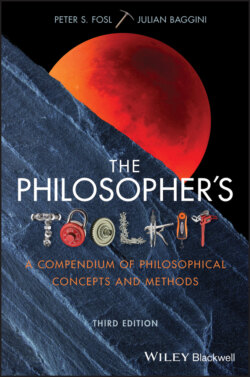Читать книгу The Philosopher's Toolkit - Julian Baggini, Julian Baggini - Страница 16
Argument and inference
ОглавлениеWhat, then, is an ‘argument’ proper? For many people, an argument is a contest or conflict between two or more people who disagree about something. An argument in this sense might involve shouting, name‐calling, and even a bit of shoving. It might also – but need not – include reasoning.
Philosophers, in contrast, use the term ‘argument’ in a very precise and narrow sense. For them, an argument is the most basic complete unit of reasoning – an atom of reasoning. An ‘argument’ understood this way is an inference from one or more starting points (truth claims called a ‘premise’ or ‘premises’) to an end point (a truth claim called a ‘conclusion’). All arguments require an inferential movement of this sort. For this reason, arguments are called discursive.
